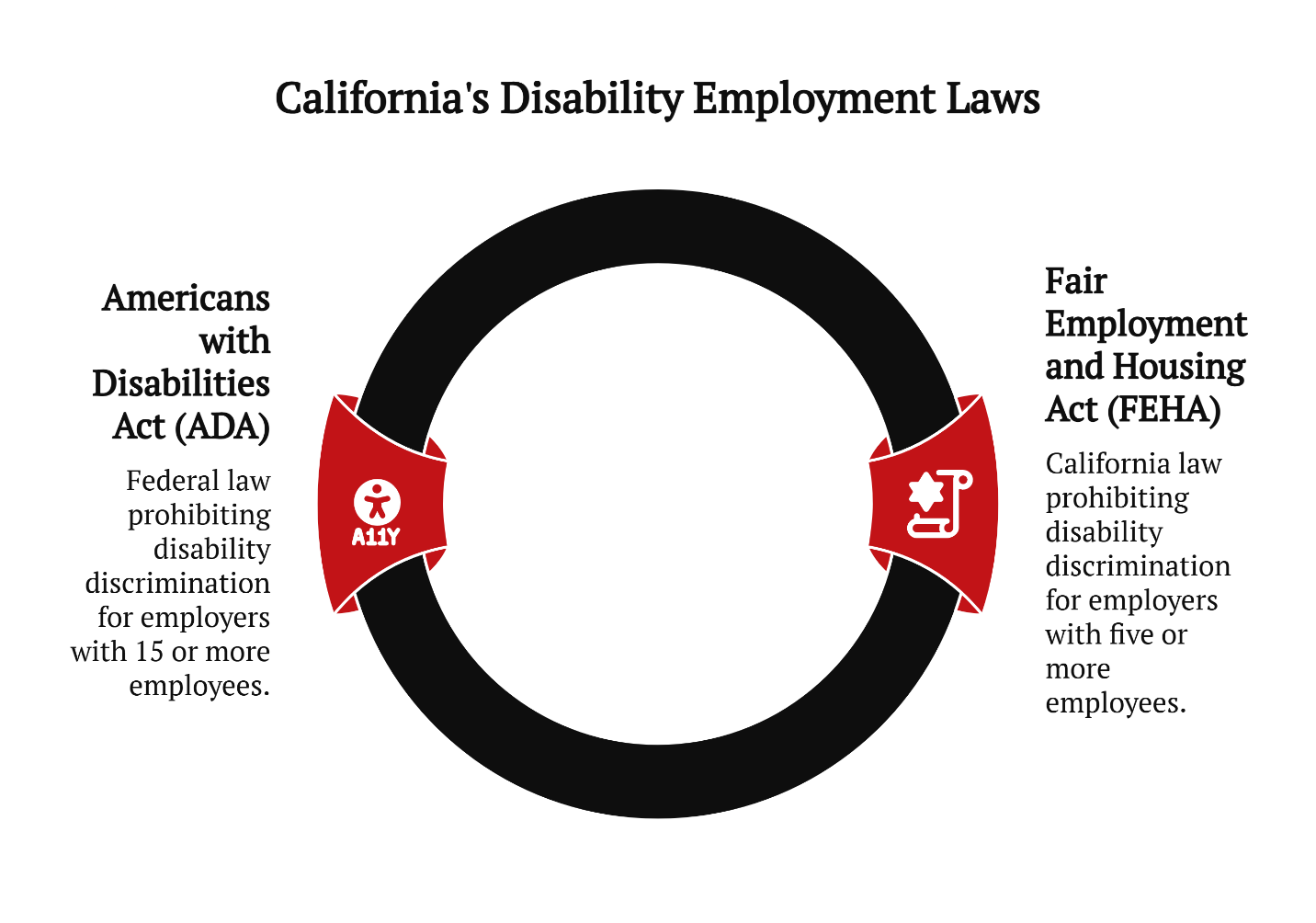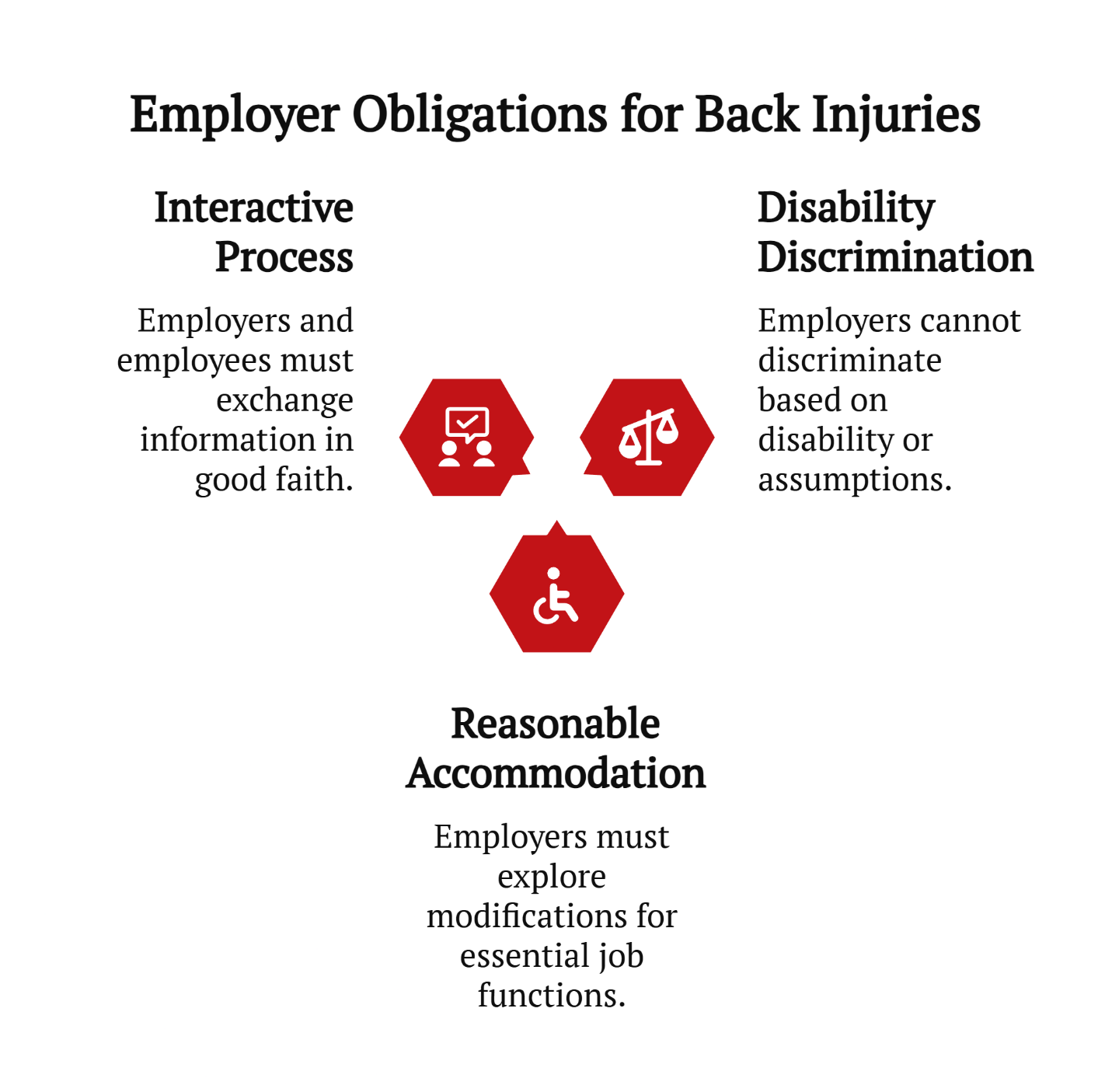📌Key Takeaways
When facing job loss after a back injury, understanding your rights and an employer’s legal duties is essential to protecting your livelihood.
Know the Legal Protections: California’s FEHA and the federal ADA both prohibit disability discrimination and safeguard employees with qualifying back injuries.
Demand the Interactive Process: Employers must engage in a good faith, timely discussion to explore reasonable accommodations before making termination decisions.
Spot Red Flags in Terminations: Sudden job loss after disclosing a back injury, refusal to discuss accommodations, or inconsistent reasons for firing may indicate unlawful conduct.
Understand Reasonable Accommodation: Modifications to job duties, equipment, or schedules that enable essential job performance are required unless they cause undue hardship to the employer.
Consult a Qualified Attorney Promptly: Given the complexity and fact-specific nature of these cases, timely legal evaluation is crucial to understanding available options.
Protecting your employment starts with knowing your rights and recognizing when professional guidance is critical.
Back injuries can significantly affect a person’s ability to work, particularly in physically demanding occupations. In California, the law provides specific protections for workers in these circumstances. When a termination occurs after an employee experiences a back injury, the situation may raise important questions about disability protections, employer obligations, and whether the termination may be unlawful.
This article focuses on general legal principles and statutory frameworks without offering legal advice or creating a professional advisor relationship. It reflects California law as of the date of publication and may not reflect future changes. For current, case-specific evaluation, consultation with a qualified employment law attorney is essential.
1. The Impact of Back Injuries in the Workplace
Back injuries can range from temporary strains to long-term spinal conditions. Their legal significance often depends on whether they limit an employee’s ability to perform essential job functions—the fundamental duties of a position.
California law distinguishes between work-related and non-work-related injuries, but the legal protections afforded under disability statutes may apply to both if the condition meets the statutory definition of a physical disability. Under California Government Code § 12926, a disability generally includes any condition that limits a major life activity, such as working.
Hypothetical Example: An employee in a warehouse position develops a chronic back condition that prevents lifting over 20 pounds. If this limitation affects essential job functions, it may trigger legal protections under state and federal law.
2. California’s Legal Framework

Two principal statutes govern disability-related employment protections in California:
- Fair Employment and Housing Act (FEHA) – Under California law, FEHA prohibits employment discrimination based on physical disability, including qualifying back injuries. It generally applies to employers with five or more employees and often offers broader coverage than federal law.
- Americans with Disabilities Act (ADA) – Federal law that prohibits disability discrimination for employers with 15 or more employees. While nationwide in scope, its protections sometimes differ from FEHA’s, making consultation important for understanding how both apply in a specific situation.
Because laws are subject to change, readers should verify statutory language with official state or federal sources before relying on it.
3. Employer Obligations Toward Employees with Back Injuries

When a back injury qualifies as a disability under FEHA or the ADA, the law provides that an employer’s obligations generally include:
- Prohibition on Disability Discrimination – Employment decisions, including termination, must not be based on the existence of a disability or assumptions about its effect on job performance.
- Reasonable Accommodation – Employers must explore modifications that would allow the employee to perform essential job functions, unless doing so would impose an undue hardship on the operation of the business.
- Interactive Process – FEHA requires a timely, good faith exchange of information between employer and employee to identify possible accommodations.
Because these obligations can be highly fact-specific, assessing whether they have been met requires professional legal evaluation.
4. Recognizing Potentially Unlawful Termination
Termination may raise legal concerns if it occurs under circumstances suggesting the decision was influenced by the employee’s disability. Indicators that may warrant further legal review include:
- Termination occurring soon after disclosure of a back injury
- Refusal to engage in the interactive process
- Reliance on assumptions rather than medical or functional evidence
- Reasons for termination that appear inconsistent with documented performance
In employment law, the term pretext refers to an alleged motivation for termination that is different from the stated reason. Determining whether pretext exists is a legal analysis that depends on evidence and context. For more, see our page on Wrongful vs. Lawful Termination.
5. Wrongful Termination and Public Policy
California law provides that wrongful termination in violation of public policy occurs when an employee is terminated for reasons that contravene fundamental statutory protections. In cases involving back injuries, this may intersect with disability discrimination protections under FEHA. Evaluating such claims requires considering both the factual record and the applicable statutory framework. Learn more about Wrongful Termination in Violation of Public Policy.
6. Why the Interactive Process Matters
The interactive process is not a mere formality—it is a statutory requirement under FEHA designed to identify workable solutions that allow an employee to remain employed while addressing functional limitations.
Hypothetical Example: An office employee with a lumbar condition requests an ergonomic chair and modified schedule. If the employer refuses to discuss these options, this could be inconsistent with FEHA’s requirement for an interactive process.
Because the adequacy of the interactive process is evaluated on a case-by-case basis, professional legal input is essential.
7. The Importance of Legal Context Awareness
Employment disputes involving back injuries often involve overlapping legal frameworks, differing definitions of disability, and varying accommodation standards. California’s FEHA is frequently more protective than the ADA, but both may apply.
Given the complexity of these laws and the fact-specific nature of termination cases, legal consultation is not only advisable but may be critical to understanding available options.
Disclaimer:
This content is for informational purposes only. This content is not legal advice. No attorney-client relationship is formed through this content. Please consult a qualified attorney in your jurisdiction for legal advice specific to your situation.
Protect Your Rights | The Akopyan Law Firm, A.P.C. | Top Gun Employment Lawyers
Have you been wrongfully terminated from your job? Have you suffered discrimination, harassment, or retaliation in the workplace? Has your employer violated wage and hour laws? If so, we can help. The Akopyan Law Firm, A.P.C. is dedicated to protecting and enforcing employees’ rights throughout Southern California. With a 97% success rate and millions recovered for our clients, our team of experienced and talented employment lawyers can fight to secure the justice you deserve.
Take the First Step Towards Securing Justice: Call us today to speak with one of our experienced employment lawyers. The firm offers case evaluations free of charge.
Contact Us Today:
- Phone: (818) 509-9975
- Office Locations: Los Angeles, Bakersfield, Costa Mesa, Temecula, Rancho Cucamonga, Oxnard, Culver City, and San Diego in California.
Important: Contacting the Akopyan Law Firm, A.P.C. does not create an attorney-client relationship, but all communications will remain private and confidential. Each case is unique. The Akopyan Law Firm, A.P.C., does not guarantee any outcome.

